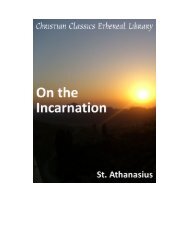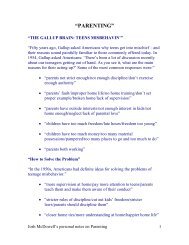Pdf Copy of Orthodoxy, by G.K. Chesterton - Christ United Methodist ...
Pdf Copy of Orthodoxy, by G.K. Chesterton - Christ United Methodist ...
Pdf Copy of Orthodoxy, by G.K. Chesterton - Christ United Methodist ...
Create successful ePaper yourself
Turn your PDF publications into a flip-book with our unique Google optimized e-Paper software.
9/ 27/ 12 The Pr oject G ut enber g eBook <strong>of</strong> O r t hodoxy, G . K. Chest er t on<br />
www. gut enber g. or g/ f iles/ 16769/ 16769- h/ 16769- h. ht m<br />
tragedy, he believed in himself. That elderly minister with an epic from whom you were<br />
hiding in a back room, he believed in himself. If you consulted your business experience<br />
instead <strong>of</strong> your ugly individualistic philosophy, you would know that believing in himself is<br />
one <strong>of</strong> the commonest signs <strong>of</strong> a rotter. Actors who can't act believe in themselves; and<br />
debtors who won't pay. It would be much truer to say that a man will certainly fail because<br />
he believes in himself. Complete self-confidence is not merely a sin; complete selfconfidence<br />
is a weakness. Believing utterly in one's self is a hysterical and superstitious belief<br />
like believing in Joanna Southcote: the man who has it has 'Hanwell' written on his face as<br />
plain as it is written on that omnibus." And to all this my friend the publisher made this very<br />
deep and effective reply, "Well, if a man is not to believe in himself, in what is he to believe?"<br />
After a long pause I replied, "I will go home and write a book in answer to that question."<br />
This is the book that I have written in answer to it.<br />
But I think this book may well start where our argument started—in the neighbourhood <strong>of</strong><br />
the mad-house. Modern masters <strong>of</strong> science are much impressed with the need <strong>of</strong> beginning<br />
all inquiry with a fact. The ancient masters <strong>of</strong> religion were quite equally impressed with that<br />
necessity. They began with the fact <strong>of</strong> sin—a fact as practical as potatoes. Whether or no<br />
man could be washed in miraculous waters, there was no doubt at any rate that he wanted<br />
washing. But certain religious leaders in London, not mere materialists, have begun in our<br />
day not to deny the highly disputable water, but to deny the indisputable dirt. Certain new<br />
theologians dispute original sin, which is the only part <strong>of</strong> <strong>Christ</strong>ian theology which can really<br />
be proved. Some followers <strong>of</strong> the Reverend R.J. Campbell, in their almost too fastidious<br />
spirituality, admit divine sinlessness, which they cannot see even in their dreams. But they<br />
essentially deny human sin, which they can see in the street. The strongest saints and the<br />
strongest sceptics alike took positive evil as the starting-point <strong>of</strong> their argument. If it be true<br />
(as it certainly is) that a man can feel exquisite happiness in skinning a cat, then the religious<br />
philosopher can only draw one <strong>of</strong> two deductions. He must either deny the existence <strong>of</strong><br />
God, as all atheists do; or he must deny the present union between God and man, as all<br />
<strong>Christ</strong>ians do. The new theologians seem to think it a highly rationalistic solution to deny the<br />
cat.<br />
In this remarkable situation it is plainly not now possible (with any hope <strong>of</strong> a universal<br />
appeal) to start, as our fathers did, with the fact <strong>of</strong> sin. This very fact which was to them<br />
(and is to me) as plain as a pikestaff, is the very fact that has been specially diluted or<br />
denied. But though moderns deny the existence <strong>of</strong> sin, I do not think that they have yet<br />
denied the existence <strong>of</strong> a lunatic asylum. We all agree still that there is a collapse <strong>of</strong> the<br />
intellect as unmistakable as a falling house. Men deny hell, but not, as yet, Hanwell. For the<br />
purpose <strong>of</strong> our primary argument the one may very well stand where the other stood. I mean<br />
that as all thoughts and theories were once judged <strong>by</strong> whether they tended to make a man<br />
lose his soul, so for our present purpose all modern thoughts and theories may be judged <strong>by</strong><br />
whether they tend to make a man lose his wits.<br />
It is true that some speak lightly and loosely <strong>of</strong> insanity as in itself attractive. But a moment's<br />
thought will show that if disease is beautiful, it is generally some one else's disease. A blind<br />
man may be picturesque; but it requires two eyes to see the picture. And similarly even the<br />
wildest poetry <strong>of</strong> insanity can only be enjoyed <strong>by</strong> the sane. To the insane man his insanity is<br />
quite prosaic, because it is quite true. A man who thinks himself a chicken is to himself as<br />
6/ 100





